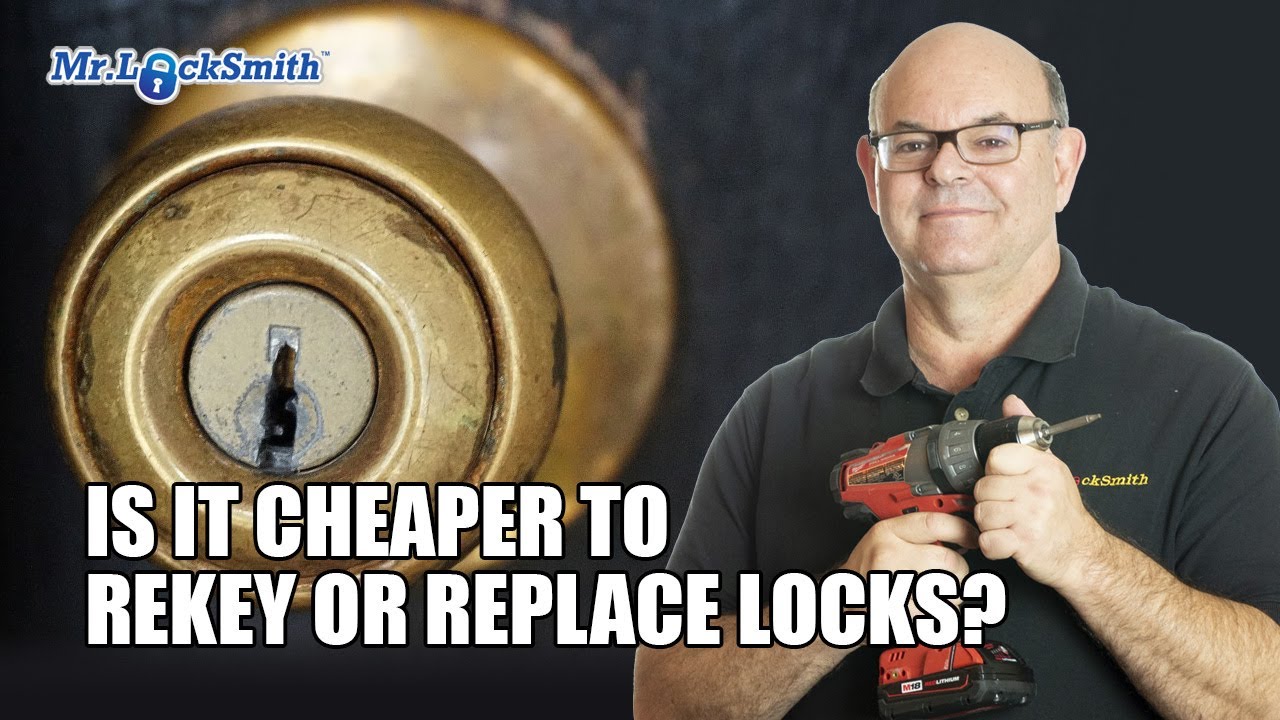Yes, you should change your locks if you lose your house keys. Losing keys can jeopardize your home’s security, granting unauthorized access to potential intruders. Promptly changing or rekeying locks enhances peace of mind and safeguards your family’s safety. Factors such as the possibility of identifiable information attached to the keys heighten the risk. Exploring cost-effective options like rekeying might suffice in some cases, while upgrading to high-security or smart locks provides extra protection. Understanding the differences and benefits of each approach is essential. By pursuing these steps, you’ll safeguard your home and find more solutions tailored to your needs.
Introduction
Home security is a paramount concern for every homeowner, and losing your house keys can present a significant dilemma. This article aims to provide expert advice on whether changing your locks is necessary after such an occurrence. By examining various circumstances and options, we will guide you in making an informed decision to safeguard your home’s safety.
Overview of the importance of home security
Prioritizing home security is essential for safeguarding your family and possessions from potential threats. Home security is a top priority for many homeowners because it forms the foundation of a safe living environment. Ensuring that your home is secure can prevent unauthorized access and protect against theft, vandalism, and other criminal activities. Evaluating the circumstances surrounding any lost keys is vital to understanding the level of risk posed. Solutions such as rekeying locks offer a cost-effective way to enhance security without the expense of entirely new lock systems. In cases where keys are stolen or involve master keys, immediate replacement may be necessary to maintain the integrity of your home’s security. These measures are integral to creating a secure, peaceful home.
Brief introduction to the dilemma of losing house keys
Losing your house keys can create an immediate and pressing concern, as it directly impacts the security and accessibility of your home. The dilemma introduces a whirlwind of questions: Were the keys simply misplaced, or could they have been stolen? Is there a potential for unauthorized access? While there isn’t a strict rule mandating lock changes, the circumstances surrounding the loss play a pivotal role in determining the next steps. If you suspect a security breach, changing the locks is highly advised. On the other hand, if you are confident that the lost keys pose no risk, rekeying might suffice. Understanding your options, such as the cost-effective solution of rekeying, is essential in making an informed decision.
Purpose of the article: providing expert advice on whether to change locks
When faced with the unsettling experience of losing your house keys, obtaining expert advice on whether to change your locks is crucial for ensuring the security and peace of mind of your household. This article aims to provide detailed, professional insights into the decision-making process. Factors such as the nature of the key loss—whether they were simply misplaced or potentially stolen—play a significant role. For instance, stolen or master keys generally necessitate a lock change for enhanced security. Alternatively, rekeying locks can be a cost-effective solution if the keys were merely lost. By understanding these nuances, you can make an informed choice that best suits your specific circumstances, ensuring your home remains a safe haven.
Understanding the Risks of Lost House Keys
Losing your house keys can expose you to significant security threats, as unauthorized individuals may gain access to your home. Evaluating the specific risks involves assessing factors such as where and how the keys were lost, and whether they can be traced back to your address. Real-life scenarios, from burglary to misuse by opportunistic finders, underscore the importance of prompt action to mitigate these dangers.
Potential security threats of lost keys
Misplaced house keys can expose your home to significant security threats by potentially granting unauthorized individuals easy access. Even with modern key mechanisms that are hard to duplicate without specialized equipment, the risk remains substantial. Intruders gaining possession of your lost keys can bypass solid wooden doors that might otherwise offer a degree of protection. This vulnerability underscores the importance of promptly changing your locks. By doing so, you not only enhance your home’s security but also gain peace of mind. Hiring a qualified locksmith guarantees that the new locks are installed correctly, offering maximum protection against potential break-ins. Prioritizing security in such situations is essential to safeguard your home and loved ones effectively.
Risk assessment: How to evaluate the threat level in your specific situation
Evaluating the threat level of lost house keys necessitates a thorough examination of several critical factors to determine the appropriate security measures. First, consider who might have found the keys and their possible intentions. If the keys were labeled with your address, the risk escalates considerably. Assess whether any identifiable personal information was attached, as this could further compromise your security. Additionally, think about the likelihood of someone using the keys to break into your home—this includes analyzing the area where you lost them. Consulting with a locksmith is a prudent step; they can help you decide whether rekeying or changing your locks is necessary based on your risk assessment. Prioritize your safety by understanding these vital elements.
Real-life scenarios of what can happen with lost keys
Imagine coming home one day to find your belongings rifled through and valuables missing, all because someone found your lost house keys. This distressing scenario highlights the security risks posed by lost keys, which can easily fall into the wrong hands. Unauthorized access to your home is a genuine concern, leading to potential break-ins and theft. Rekeying or changing your locks immediately after losing your keys is vital in preventing such incidents. Modern lock mechanisms might offer additional security features, but the most effective approach is hiring a qualified locksmith. They can implement proper security measures, ensuring your home remains a safe haven. By taking prompt action, you safeguard your property and peace of mind.
When Should You Change Your Locks?
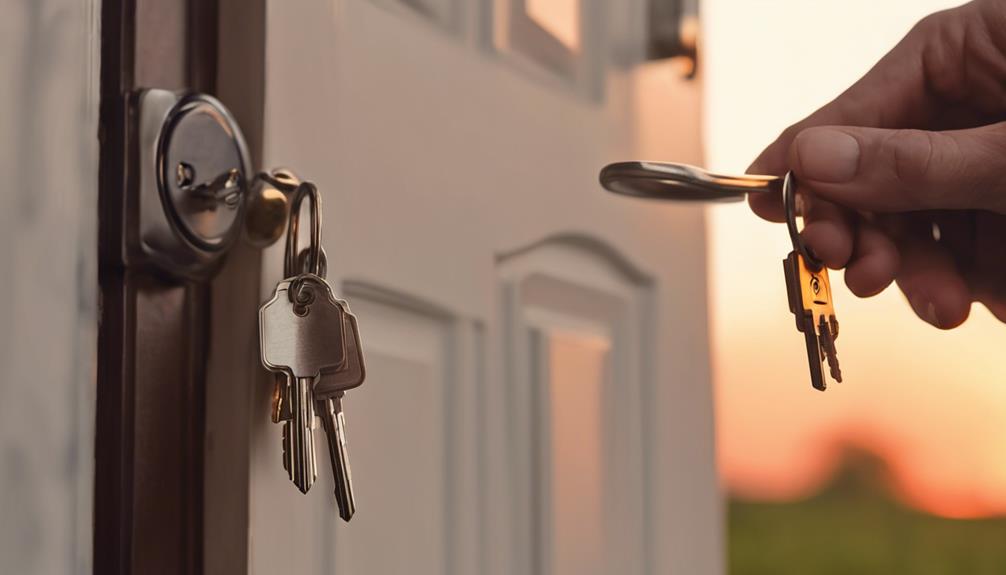
Determining the right time to change your locks is essential for maintaining home security, especially after losing your house keys. Immediate actions, such as rekeying or replacing locks, should be considered if the keys were stolen or if there is a risk that someone could use them to gain unauthorized access. Evaluating your home’s security needs will help you decide whether a simple rekeying suffices or a complete lock change is necessary to guarantee your safety.
Immediate actions to take when keys are lost
When you realize your house keys are lost, the first step is to calmly assess the situation to determine the level of immediate action required. Begin by retracing your steps to see if the keys can be recovered. If they remain missing, evaluate whether they were simply misplaced or potentially stolen. Misplaced keys might only necessitate rekeying your locks, a cost-effective solution that maintains your security. Conversely, if you suspect theft or compromised security, replacing the entire lock could be prudent. Always consider whether spare keys are accessible within the house, which might minimize the urgency. Ultimately, there’s no strict rule—carefully assess and decide on the best course of action to safeguard your home.
Situations that necessitate changing locks immediately
Evaluating the urgency of changing your locks becomes paramount in certain situations, particularly where there is a potential risk of unauthorized access. If your lost keys were stolen or if you suspect a security breach, changing your locks is vital to guarantee safety. This action is especially important if the keys can access multiple entry points or could have been copied. While rekeying offers a cost-effective alternative when keys are simply misplaced, it’s imperative to assess each scenario individually. Spare keys left inside the house may not always necessitate a lock change, but a thorough evaluation is essential. When in doubt, consult a professional locksmith to accurately determine the need for changing your locks and safeguarding your home.
Evaluating your home’s security needs
How can you accurately assess your home’s security needs to determine whether changing your locks is the right course of action? Begin by considering how your keys were lost. If theft is a possibility or if someone might possess a master key, changing the locks is advisable for enhanced security. For misplaced keys, rekeying offers a cost-effective solution, especially if you still have the old key. Evaluate whether the lost keys were your only set and if there are any spare keys inside the house. This assessment will help you gauge the risk factors involved. Ultimately, the goal is to make an informed decision that provides peace of mind and guarantees your home remains secure.
Alternatives to Changing Your Locks
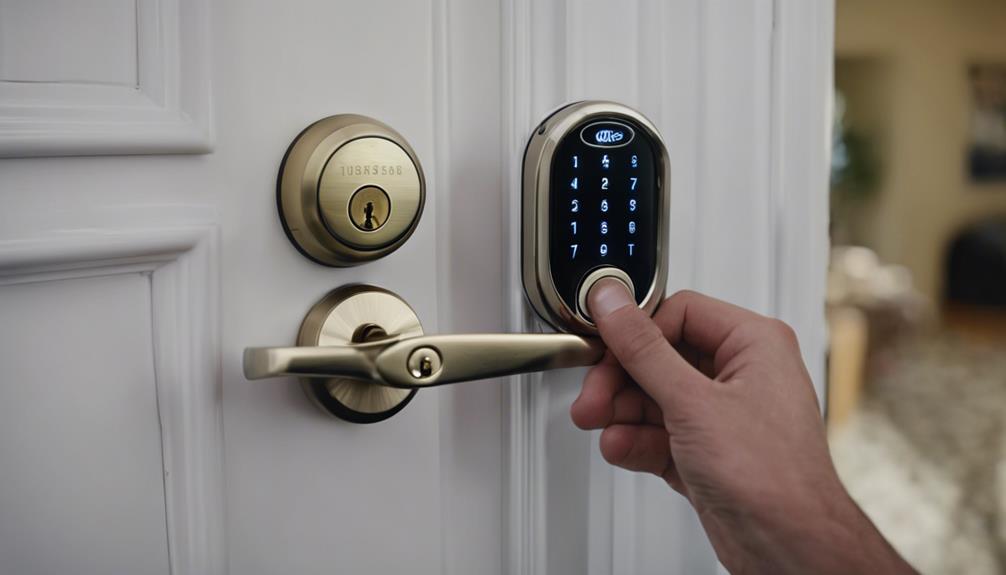
Exploring alternatives to changing your locks can reveal practical and cost-effective solutions, such as re-keying. Re-keying involves modifying the internal components of your existing locks, making old keys obsolete, and offering a fresh level of security without the expense of entirely new hardware. We’ll examine the differences between re-keying and changing locks, the benefits and drawbacks of each, and identify scenarios where re-keying is the most suitable option.
Re-keying vs. changing locks: What’s the difference?
When considering whether to rekey or change your locks, it’s important to understand the fundamental differences and benefits of each option to make an informed choice. Rekeying involves altering the internal components of the existing lock to work with a new key, making it a quick and cost-effective solution if your locks are in good condition. In contrast, changing locks entails installing a completely new lock and key system, which may be necessary if you require a higher level of security or if your current locks are worn out. Rekeying is ideal for maintaining existing security levels with new keys, while changing locks offers a fresh start with enhanced security options, depending on your specific needs.
Pros and cons of re-keying locks
Understanding the advantages and disadvantages of re-keying locks can help you make the best decision for your home’s security needs. Rekeying is a cost-effective solution, typically ranging from $50 to $100, that involves replacing the tumblers and pins in your existing lock. This process allows you to maintain your current hardware while ensuring a new key is required. It’s particularly beneficial when consolidating multiple lock keys or enhancing security after moving into a new home. Additionally, rekeying quality locks can save you both time and money compared to full replacements. However, it may not be suitable if the lock is damaged or outdated, as rekeying does not improve the lock’s physical condition or security features.
Situations where re-keying is a viable option
In various scenarios, such as moving into a new home or wanting to consolidate multiple keys, re-keying your locks provides a cost-effective and efficient alternative to completely changing them. Typically ranging from $50 to $100, re-keying involves a locksmith replacing the tumblers and pins in your existing locks, which instantly enhances security. This method is particularly beneficial when you have high-quality locks that you wish to retain, as it saves you on labor costs while still ensuring your home is secure. Additionally, re-keying is ideal if you have different keys for multiple locks, making your life simpler and more convenient. However, if keys are stolen or master keys exist, consider changing the locks for enhanced security.
How to Choose the Right Lock Replacement
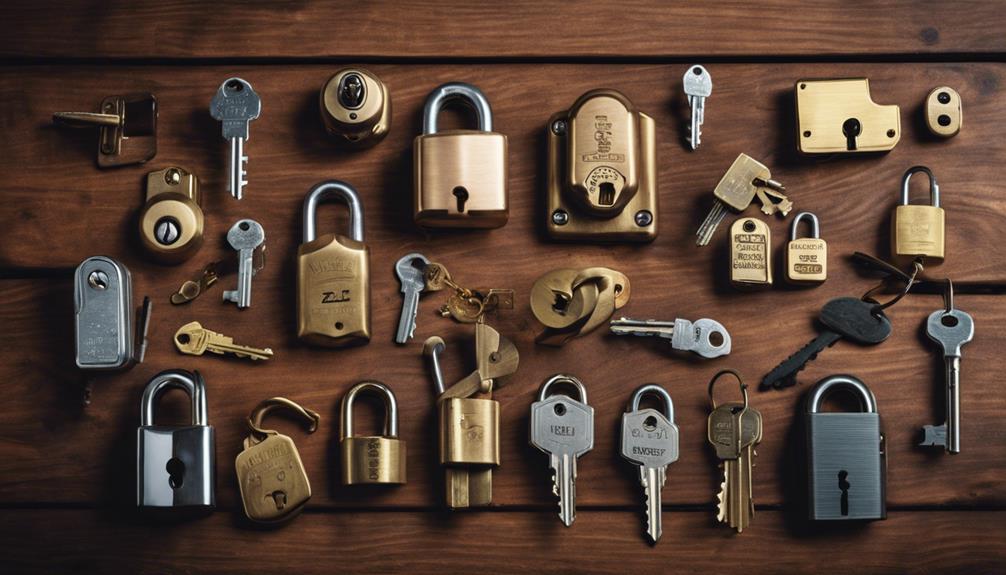
Choosing the right lock replacement involves understanding the various types of residential locks, such as Euro lock cylinders, Mortice locks, and Yale locks, and considering factors like security features and ease of installation. Upgrading to high-security or smart locks can notably enhance your home’s protection and offer added convenience. For the best results, seek advice from professional locksmiths and prioritize quality to guarantee your new lock meets your specific security needs.
Types of residential locks suitable for replacement
Selecting the appropriate replacement for your residential locks is paramount to guaranteeing the security and safety of your home. Euro lock cylinders, Mortice locks, and Yale locks are excellent choices to ponder for enhanced security. Explore tutorials or consult a professional locksmith to identify the lock that best suits your needs. Remember, high-quality locks are crucial; prioritize their security features. Locksmiths employ specialized tools and techniques to ensure your new locks are installed correctly, providing peace of mind. Following police recommendations and integrating multiple locking systems can further fortify your home. Each lock type offers unique benefits, so choose wisely to maintain the sanctuary of your residence.
Factors to consider when selecting new locks
When determining the essential lock replacement for your home, it’s important to evaluate the specific security needs and potential vulnerabilities unique to your property. Begin by considering the type of lock that best suits your requirements—whether it’s Euro lock cylinders, Mortice locks, or Yale locks. High-quality locks are paramount to safeguarding against intrusions, so investing in durable options is vital. Enhance your security by employing multiple locking systems and adhering to police recommendations for best safety. Consulting with professional locksmiths and watching detailed tutorials can guarantee proper installation and maximize your lock’s effectiveness. Understanding the security implications and choosing robust, high-quality locks can greatly strengthen your home’s defenses, providing you with peace of mind and enhanced security.
Benefits of upgrading to smart locks or high-security locks
Upgrading to smart locks or high-security locks can greatly enhance your home’s security by offering advanced features like keyless entry, remote access, and robust defense mechanisms against common break-in techniques. Smart locks provide the convenience of managing access remotely and tracking activity, guaranteeing you always know who enters and exits your home. High-security locks, on the other hand, boast attributes such as drill resistance, pick resistance, and reinforced strike plates, greatly increasing your home’s defense against intrusions. When selecting a lock replacement, consider factors like durability, warranty, and security ratings to guarantee top protection. Consulting with a locksmith can help tailor your choice to meet specific security needs, offering peace of mind and deterring potential burglars.
Cost Implications of Changing Locks
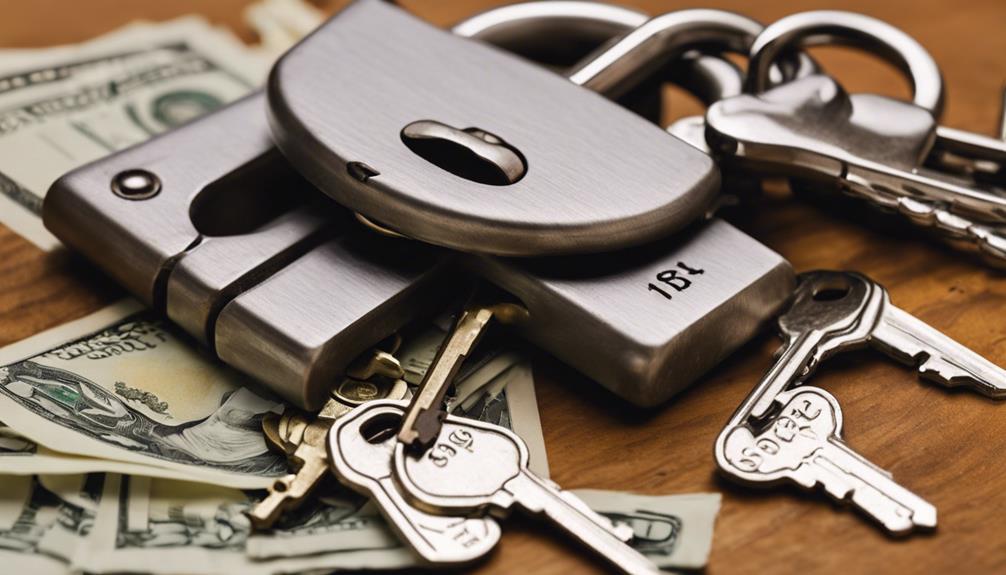
Understanding the cost implications of changing locks is essential when you lose your house keys. The expenses can vary greatly, with lock replacement costing around $75 per hour for labor and rekeying averaging between $50 and $100. By comparing the costs of rekeying versus replacing locks and exploring money-saving tips, homeowners can make informed decisions that best suit their budgets.
Breakdown of costs associated with changing locks
Changing the locks on your home can involve several costs, ranging from labor fees of approximately $75 per hour to the price of the new locks, which can be up to $100 each. These expenses can vary based on the type and quality of the lock you choose. For modern homes, you might consider a DIY approach to save on labor costs. However, older homes or those with complex locking systems often require professional assistance to make sure proper installation. Additionally, testing the new lock thoroughly before finalizing the installation is essential to guarantee its functionality. Upgrading your locks not only enhances security but also provides an opportunity to modernize your home’s appearance and replace outdated or worn-out locks.
Comparing costs of re-keying vs. replacing locks
When weighing the expenses associated with changing locks, it’s important to assess whether rekeying, which generally costs between $50 to $100, might be a more economical and equally effective option for enhancing home security. Rekeying primarily involves labor costs, making it a budget-friendly alternative to replacing locks, which can cost around $75 per hour. Quality locks can often be rekeyed by professional locksmiths, preserving your investment while improving security. Additionally, DIY rekeying kits, priced between $10 and $25, are available, though you’ll need the old key to proceed. Ultimately, rekeying is an excellent choice for those looking to consolidate multiple keys or secure a new home without the higher expense of full lock replacement.
Tips for saving money on lock replacement services
To save money on lock replacement services, consider scheduling multiple lock changes at once to benefit from bulk service discounts and reduced labor fees. Opting for rekeying instead of replacing locks can be notably more economical, with costs ranging from $50 to $100 compared to the $75 per hour for labor-intensive replacements. For those comfortable with DIY projects, rekeying kits are available for as low as $10 to $25. However, remember to have the old key on hand to guarantee the process goes smoothly. DIY lock changing can be a viable option for modern homes, but older homes or complex systems may necessitate professional assistance. By strategically planning, you can secure your home without breaking the bank.
Steps to Take After Changing Your Locks
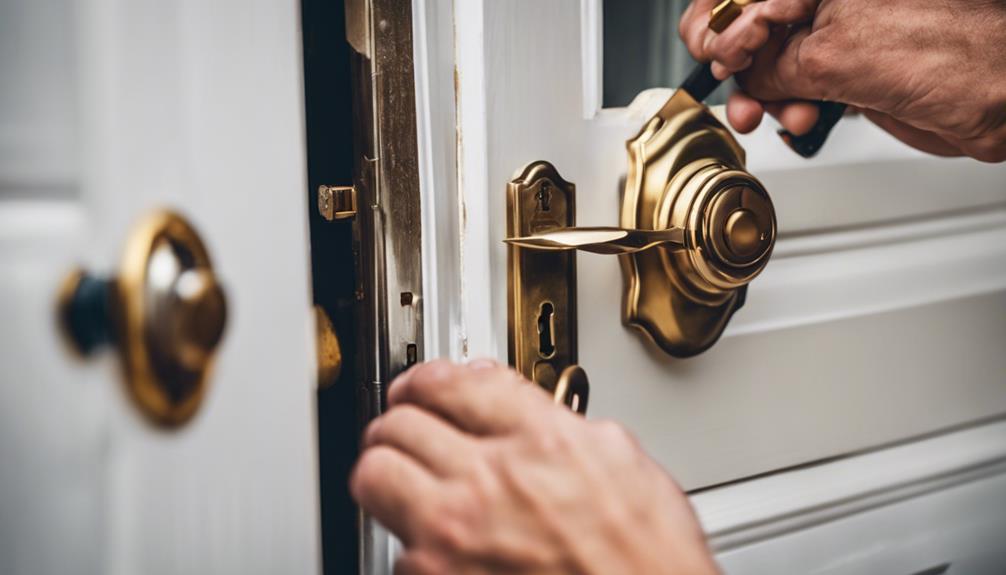
After changing your locks, it’s essential to make sure that the new keys are distributed securely to trusted individuals. Additionally, consider implementing supplementary security measures, such as installing security cameras, to bolster your home’s safety. Regular maintenance and periodic check-ups of your new locks will also help in detecting any signs of tampering or potential security breaches.
Ensuring new keys are distributed securely
Properly distributing new keys is paramount to maintaining your home’s security and guaranteeing that only trusted individuals have access. Begin by meticulously tracking the number of keys created and to whom they are given. This vigilance helps prevent unauthorized access and guarantees accountability. Collect any surplus keys to further reduce risks. Consider adding an extra layer of security by upgrading to a keyless entry system or smart locks, which offer both enhanced protection and convenience. Don’t forget to change any codes or access credentials associated with your new locks. Regularly reviewing these protocols will help you stay ahead of potential security threats and maintain a safe and secure home environment.
Implementing additional security measures (e.g., installing security cameras)
Boosting your home’s security by implementing additional measures, such as installing security cameras, can greatly strengthen your defense against potential threats. Surveillance cameras serve as a powerful deterrent to burglars and can provide invaluable footage in the event of a security breach. Integrating these cameras with smart home systems enhances your ability to monitor and receive alerts remotely, ensuring peace of mind even when you’re away. Strategically placing cameras around your property is vital for excellent coverage; consulting with professional locksmiths can offer insights into the best locations post lock replacement. This proactive approach not only fortifies your home but also fosters a sense of safety and reassurance for you and your loved ones.
Regular maintenance and check-ups for new locks
Maintaining your home’s security doesn’t stop at installing new locks and additional measures; regular maintenance and check-ups for these locks are equally important to sustain their effectiveness and longevity. Start by checking for loose screws and lubricating moving parts to guarantee smooth operation. Securely fasten the strike plate and align it properly to strengthen the door frame. Regularly inspect the door alignment to prevent excessive wear on the lock. Periodically duplicate keys to have spares for emergencies, reducing the risk of lockouts. Conduct thorough inspections to identify any signs of wear or damage, addressing issues promptly to maintain peak security. This diligent upkeep ensures your locks remain reliable and your home safe.
The Role of Professional Locksmiths in Enhancing Home Security
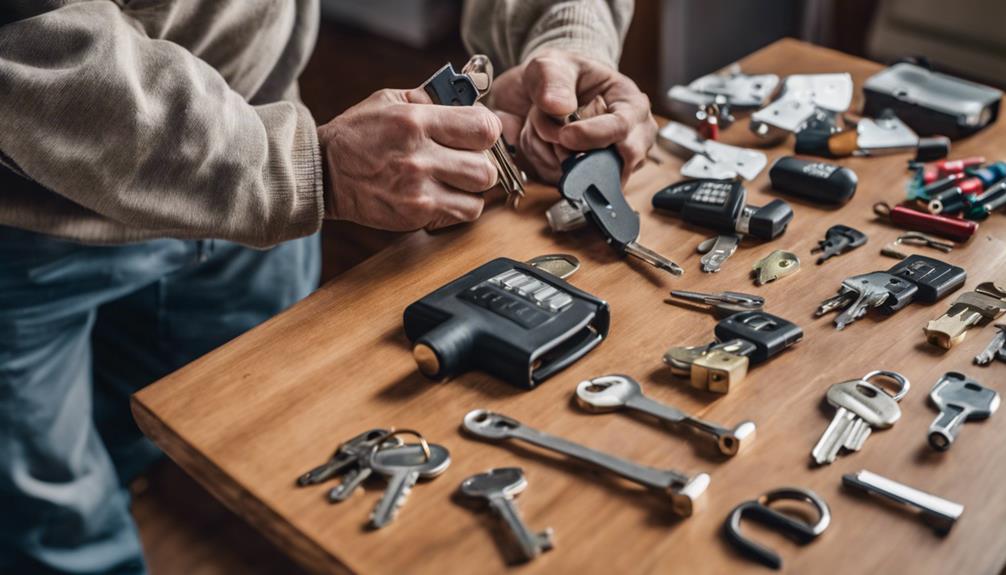
Engaging a professional locksmith is crucial for thoroughly evaluating and enhancing your home’s security. These experts utilize specialized tools and techniques to recommend and install high-quality locks and multiple locking systems, thereby greatly strengthening your defenses. Consulting with locksmiths, such as those from Low Rate Locksmith, guarantees you receive tailored advice on lock replacement or re-keying, aligning with the latest security standards and police recommendations.
How professional locksmiths can assess and improve your home’s security
Professional locksmiths play an essential role in evaluating and enhancing your home’s security by identifying potential vulnerabilities and implementing advanced locking systems. These experts meticulously assess your current security measures, spotlighting areas that require attention. They recommend and install robust locks like Euro cylinders, Mortice locks, and Yale locks, guaranteeing each lock aligns with police recommendations. With specialized tools and techniques, locksmiths guarantee proper installation and peak functionality. Additionally, they advocate for the integration of multiple locking systems to fortify your home’s defenses. Investing in these high-quality security enhancements not only protects your property and loved ones but also provides invaluable peace of mind. Trusting a professional locksmith ensures your home remains a safe haven.
Benefits of consulting with a locksmith for lock replacement or re-keying
Consulting with a locksmith for lock replacement or re-keying provides invaluable expertise that guarantees your home’s security is both robust and up-to-date. Professional locksmiths meticulously assess your home’s security needs, recommending the best lock solutions tailored to your unique situation. Their specialized tools and techniques ensure that new locks are installed with precision, maximizing security. Additionally, locksmiths offer detailed insights into the security features of various lock types, empowering you to make informed decisions. They also suggest additional measures to enhance overall security, ensuring thorough protection. By seeking professional advice, you can confidently upgrade your home security, knowing that your choices are backed by expert knowledge and experience.
Services offered by Low Rate Locksmith for residential security needs
Low Rate Locksmith offers an extensive array of residential security services in Miami, ensuring that homeowners have access to top-tier lock installation, rekeying, and emergency lockout assistance. Their professional locksmiths prioritize customer safety and satisfaction, providing invaluable advice on enhancing home security. Clients consistently praise Low Rate Locksmith for their swift response times, exceptional service quality, and adept handling of security concerns. Serving Miami and surrounding areas, they are committed to delivering quick, reliable solutions for all security needs. Contact Low Rate Locksmith for any residential security concerns; their experienced team is dedicated to keeping your family and possessions safe. With a focus on detail and customer care, they are your trusted partner in home security.
Frequently Asked Questions
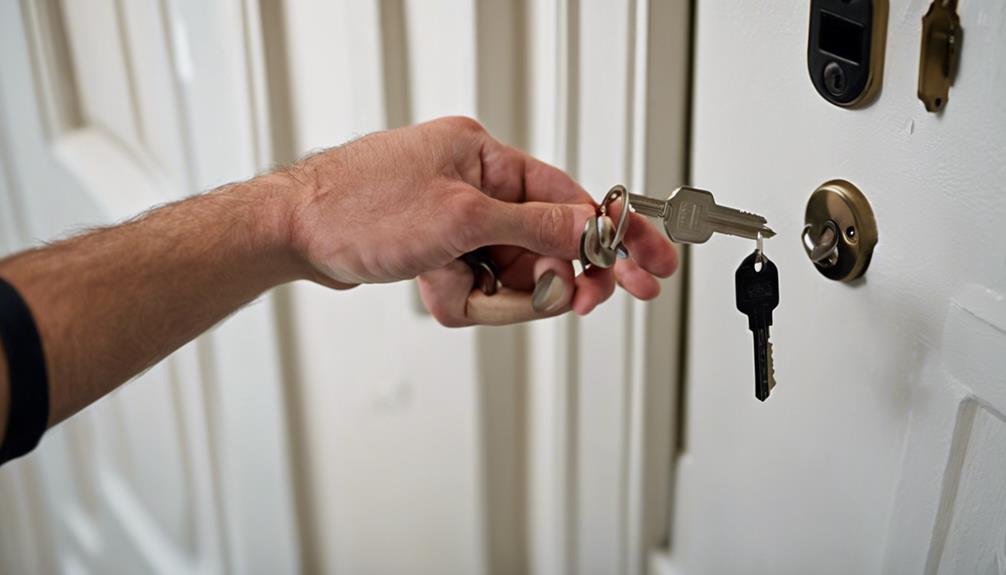
In this section, we address the most pressing questions homeowners have about losing their house keys and the necessity of changing or rekeying locks. From understanding the cost-effectiveness of rekeying to knowing the best frequency for lock changes, our expert insights aim to equip you with the knowledge needed to maintain robust security. Read on to find professional advice and practical solutions to your key-related concerns.
Common concerns and questions about losing house keys and changing locks
Addressing the myriad concerns and questions surrounding the loss of house keys and the necessity for changing locks is essential for maintaining home security and peace of mind. Many wonder if they should rekey or replace their locks. Immediate rekeying is important to safeguard against unauthorized access. If keys were stolen or you suspect foul play, changing the locks is strongly recommended. Regular rekeying every three years can greatly enhance security. Businesses often adopt a stricter schedule, rekeying every six months to a year. Consulting a qualified locksmith is invaluable for tailored advice on whether to rekey or replace locks after losing your keys. Ensuring these measures are taken promptly can prevent potential security breaches.
Expert answers and advice on addressing these concerns
To help homeowners navigate the complexities of losing their house keys and deciding on the best security measures, experts provide clear and practical answers to frequently asked questions. Rekeying your locks is often an important solution if your keys are simply misplaced. However, if you suspect theft or a security breach, changing the locks is advisable. It’s vital to act if lost keys had spares inside your home. Consulting a professional locksmith can offer personalized advice tailored to your specific situation. Assess how the keys were lost to determine whether rekeying or replacement is most appropriate. Expert guidance guarantees that you maintain the utmost security and peace of mind for your home.
Conclusion

To sum up, the decision to change or rekey your locks hinges on the specifics of how your keys were lost and the associated security risks. Prioritizing home security is essential, and periodic rekeying or lock replacement is a prudent measure to safeguard your property. For professional guidance and assistance, consider reaching out to Low Rate Locksmith to guarantee your home remains secure and protected.
Recap of key points discussed in the article
Given the importance of home security, deciding whether to change your locks after losing your house keys hinges on several key considerations. The primary factor is how the keys were lost. If they were misplaced, rekeying offers a cost-effective solution. However, if the keys were stolen or if there’s a risk someone might possess a master key, changing the locks is advisable. The necessity of changing locks also diminishes if spare keys are safely inside your home. Additionally, rekeying is a wise decision when moving into a new home or when consolidating multiple lock keys. These considerations guarantee that you maintain the highest level of security without unnecessary expenses.
Final advice on the importance of maintaining home security
Maintaining robust home security is an essential practice that not only safeguards your property but also guarantees the safety and peace of mind of your loved ones. Regularly updating your security measures, including rekeying or changing locks, is crucial in preventing unauthorized access and mitigating potential risks. If you’ve lost your house keys, promptly addressing the situation by consulting a qualified locksmith ensures that you make an informed decision tailored to your specific needs. Whether it’s rekeying for a cost-effective solution or changing locks for maximum protection, prioritizing these actions reinforces the security of your home. Taking proactive steps in maintaining your home’s security is an investment in the well-being and tranquility of your household.
Encouragement to contact Low Rate Locksmith for professional assistance
Contacting Low Rate Locksmith for professional assistance guarantees that your home’s security concerns are addressed promptly and effectively. Offering expert services in changing locks or rekeying, the skilled professionals at Low Rate Locksmith can assess the security risks associated with lost house keys and recommend the best solutions. Their prompt response assures that your home’s security is not compromised, providing you with invaluable peace of mind. Trusting Low Rate Locksmith means saving time and money while securing your home against potential threats. Their dedication to excellence ensures that you receive not only a service but a safeguard for your sanctuary. Don’t leave your home’s security to chance—reach out to Low Rate Locksmith today.
Frequently Asked Questions
Can Smart Locks Be a Good Replacement for Traditional Locks After Losing Keys?
Absolutely, smart locks can be an excellent replacement for traditional locks after losing keys. They provide keyless entry, enhancing convenience and security. Features such as remote access, temporary access codes, and activity logs guarantee you have full control over entry. Integration with smart home systems, advanced encryption, and tamper alerts further elevate your home’s security. While professional installation might be needed, the long-term benefits are substantial.
How Often Should You Update Your Home Security System?
Updating your home security system every 3-5 years is generally recommended for maximum protection. However, advancements in technology and evolving security risks may necessitate more frequent updates. Regular evaluations of your security needs, especially after a breach or significant change in circumstances, guarantee proactive safeguarding of your property. Consulting a professional locksmith or security expert can help you determine the best timing and options for your security updates.
Are There Temporary Solutions for Securing Your Home After Losing Keys?
Yes, there are temporary solutions for securing your home after losing keys. You can secure windows, request neighbors to stay vigilant, and use a door jammer or security bar. Installing a temporary lock or latch adds extra protection. A keyless entry system or smart lock also offers a robust temporary measure. Engaging a locksmith for emergency lockout services guarantees immediate security. Avoid hiding spare keys outside; instead, reinforce doors.
What Should You Do if You Suspect Someone Has Duplicated Your Lost Keys?
If you suspect someone has duplicated your lost keys, it is imperative to take immediate action to secure your home. Changing your locks is a proactive measure to prevent unauthorized access, ensuring the safety of your property and loved ones. Alternatively, rekeying the locks allows you to maintain existing hardware while rendering old keys useless. Consulting with a professional locksmith will provide tailored advice for your specific situation, enhancing your security and peace of mind.
Can Home Insurance Cover the Cost of Changing Locks?
Surprisingly, your home insurance policy might coincidentally cover the cost of changing locks if you lose your house keys. Reviewing the specifics of your policy is essential, as some plans include provisions for lost key-related expenses, including locksmith services. Engaging with your insurance provider can clarify whether such coverage is available to you, ensuring that you are well-protected and minimizing any financial burden associated with securing your home.

